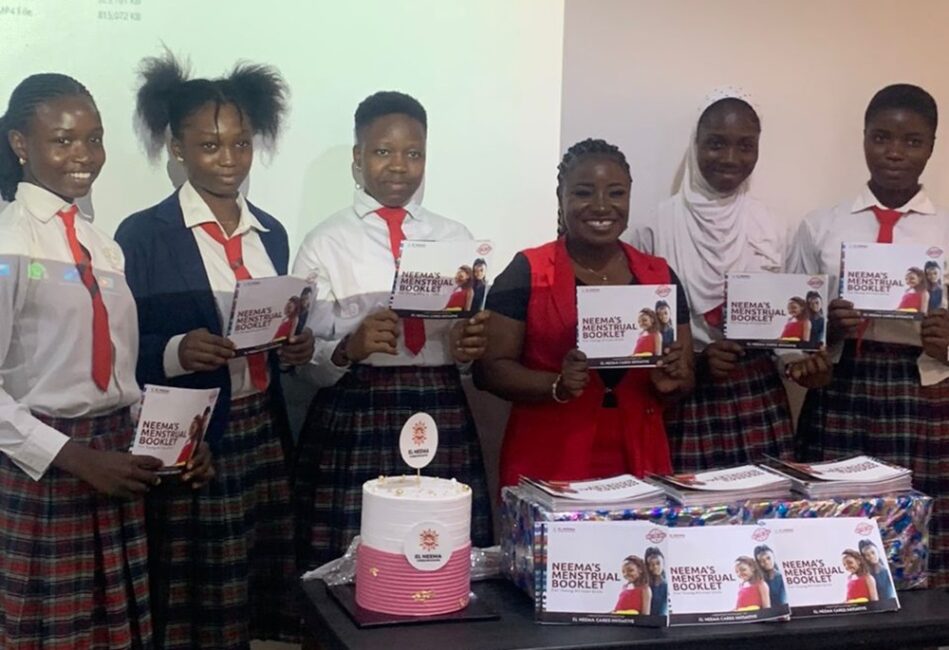Stakeholders Galvanize Support To Stop Female Students From Using Rags, Tissue Papers During Menstrual Flow
Stakeholders in Nigeria’s female reproductive health system are galvanizing support to end menstrual pad poverty among young female students and women in Nigeria.
The stakeholders came together on Saturday in Abuja to give support to the launching of a book on menstrual hygiene written by the Founder of El Neema Cares Initiative, Ms Mabel Adeojo.
Advertisement
The book titled, “Neema’s Menstrual Booklet” deals with issues affecting menstrual flow and women reproductive system.
Speaking during the event held at the sidelines of the Founder’s birthday, Adojo said she embarked on the initiative four years ago while serving as a youth corp member after discovering a critical gap in menstrual hygiene among girls in Kaduna.
During her first gathering in a community within Kaduna state, Adojo said she educated 206 girls about menstrual hygiene.
According to the menstrual education expert, she found out that these girls were resorting to using clothes, tissues, and rags as makeshift sanitary pads, which posed serious health risks.
Advertisement
Since the initiation of the project, Adojo said she has personally funded it and occasionally visits schools to raise awareness and provide support.
She highlighted the rising cost of sanitary pads, emphasizing the need for more affordable options.
Adojo advised those interested in menstrual hygiene projects to focus on sustainability rather than one-off initiatives.
She advocated for the use of reusable pads as a more cost-effective and environmentally friendly option.
Adojo also emphasized the importance of educating boys about menstruation, encouraging them to learn how to support and care for girls during their periods.
Advertisement
She said, “Over the last four years, I have been to several schools for my usual ‘pad a Yarinya outreach’ and I get questions that bothers around what is contained in the booklet, but most times I don’t get the chance to discuss and answer the questions because of the brevity of time allotted to me, so I thought it would be a good reason to write a booklet that contains the answers to their questions and then give the book out to them when I go for outreaches.
“I run public school outreaches and also community outreaches where by I reach out to both school and out of school girls, talking to them on sexual purity and menstrual hygiene, then I gift them with menstrual hygiene kits.
“So henceforth, I will go along with the booklets and gift the girls along side other menstrual hygiene materials. I only look forward to getting sponsors and partners because over the years these outreaches are personally funded and now even the booklet would be given to the free of charge.”
Adojo explained that the initiative was born out of the realization that the government cannot single-handedly address all societal needs, urging individuals and organizations to support citizens in any way they can.
She specifically chose Sustainable Development Goal 3, which focuses on good health and well-being, as the core objective of El Neema Cares Initiative.
When asked on how she hopes to break some of the stereotypes that go with menstrual cycle with her initiative, she said, “There is hardly any jinx that knowledge cannot break through knowledge and information.
Advertisement
“Once a person is well informed on the subject of menstruation and all that bothers around it, that person would have come out of the cultural stereotype on that matter and as she informs her friends or school mates, more people get delivered out of the shackles.
“This will seek to do by providing documents and documentaries that would help fight this poverty knowledge.This booklet is also very easy to read with few pages and pictures, as it is a way to encourage these young ones to read.”
The Chief Executive Officer of BTC, and the founder of Bambini Africa,
Raquel Daniel, who was the special guest of honor said the primary goal is to provide sanitary towels to indigenous girls, with the aim of keeping them in school and breaking cycles of educational disadvantage.
She shared how her own journey as the first college graduate in her family fueled her passion for menstrual health and hygiene.
The participating schools included Government Girls Secondary School Dutse Alhaji, Government Day Secondary School Dutse Alhaji, Beacon Height School, and Government Day Secondary School Wuse 2.
The occasion featured testimonials from beneficiaries of the Nyarinya Scholarship program, including Mercy Ochigbo, Eucharia Kadiri, and Mrs. Bamidele.
They expressed gratitude for the initiative, highlighting how it has helped them save money and maintain cleanliness and good health.
Several adults also shared testimonials praising Adojo’s dedication and the impact she has made in the lives of young girls.








